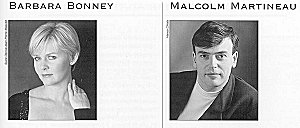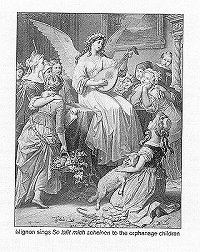 The 1999/2000 Wigmore Hall season opened to a full house with a
queue for returns. Barbara Bonney framed her recital with the Mignon songs
from Wilhelm Meister as set by Schubert and Wolf. She took a little
while to settle and was in much better voice for the Wolf versions, having
not quite convinced as the frail, vulnerable Mignon depicted in Schubert's
settings and depicted in the programme illustrations.
The 1999/2000 Wigmore Hall season opened to a full house with a
queue for returns. Barbara Bonney framed her recital with the Mignon songs
from Wilhelm Meister as set by Schubert and Wolf. She took a little
while to settle and was in much better voice for the Wolf versions, having
not quite convinced as the frail, vulnerable Mignon depicted in Schubert's
settings and depicted in the programme illustrations.

Between those groups Barbara Bonney tried an experiment in audience involvement and informality by inviting a show of hands to suggest what she should sing from a short list provided. This included some rare settings by Duparc, Verdi, Grieg and Ives, alongside lesser-known Goethe lieder by Clara and Robert Schumann and several other German composers. The exercise was like trying to catch the Speaker's eye in Parliament! To some requests she responded immediately; others were deflected to preferences of her own. There was applause after each item; this can be the bane of song recitals.
It might have been better simply to opt for singing her own choices on the night, as no doubt would have happened in Schubert's gatherings with his friends. It must be frustrating to come to a platform committed to a programme settled months or years ahead. Two contrasted songs from Beethoven's Egmont were striking, as was Spohr's Meine Ruh. A fragment by Schubert, Gretchens Bitte, was the most memorable of all.
No reservations whatsoever about the Master Class the next night, wholly absorbing and revelatory from beginning to end. The young singers admitted they were terrified before the knowledgeable Wigmore Hall audience (Barbara Bonney confessed that she too had felt so the previous evening!) but they were quickly put at ease and each one was flexible enough to respond immediately to subtle advice about vocal technique.
Miranda McDonnell began with a poised, beautiful account of Mozart's Abendemfindung and was then helped with her vowels in the high register. She was advised to take breaths freely whenever she felt she wanted to, and encouraged towards far more emotional involvement in Mahler's Liebst du um Schönheit. Louise Mott was helped to scale down her singing in two of Schumann's Frauen liebe und leben by not opening her mouth too much and thereby "losing steam" so as to "make your prettiest sound with least effort." The turns in the second were worked on, to be varied at each repetition spontaneously without pre-planning. Similar advice to Bibi Heal for the strenuous and demanding Gretchen am Spinnrade; a tiring song, so she was guided towards less air intake and minimal vibrato. Relaxation and husbanding resources were paramount. She was helped to find a "speech platform at ear level" and to not support the breath with the diaphragm all the time, which is tiring. Barbara Bonney urged sparing use of vibrato throughout the evening, "use vibrato judiciously to save energy", and also because it is now obligatory with many conductors for early music.
This theme was pursued most dramatically with Jeremy Vinogradov, a baritone who sung a light Mozart song about a cross tempered Cupid with heavy vibrato throughout. He was urged to "simplify, like a ten year old, be a little kid - go back to your childhood, take away all the technical stuff, strip away - - taught processes only trip us up - less is more and feels easier, cultivate less resistance". He was helped to shape appogiaturas expressively, and to avoid a rigid tempo, "stretch like Strauss, don't make it too easy for your accompanist". The transformation was spectacular and led to a far more expressive and idiomatic light tenor rendering, and afterwards to open discussion of what might be Jeremy Vinogradov's true voice!
Barbara Bonney's approach was warm and spontaneous, constantly supportive and reassuring. It was this which made it possible for her to achieve all this work quickly and in front of a full Wigmore Hall audience, which was welcomed into open discussion, as too were Malcolm Martineau and the singers themselves. We heard about tempo, to be set by the accompanist within broad boundaries, thereafter "going with the flow", the singer having to take responsibility to establish and maintain control, always subtly, never blatantly obvious. Posture and arm movement should let the body react. Gestures must be sincere, prepared gestures come across as insincere. Barbara Bonney discussed how she learns songs, the text thoroughly first "how the composers did it", only then the music. She was against over-learning and over-preparation, and says she is far more likely to find herself tripped up in the songs she knows best, "less work the better"!
This was the best Master Class I can remember, a great singer in her prime who delights in sharing her love of the world of song, and her wisdom and experience, in a relaxed, friendly manner which made it possible for all these young singers to give better than their best. Each of them will have taken home a priceless tape recording of an invaluable lesson, and each singer was so good and intelligent that we will look out for opportunities to hear them again in the future. An exceptional evening.
Peter Grahame Woolf
 Return to:
Return to: